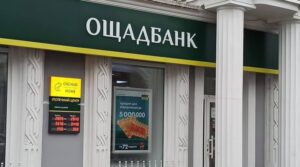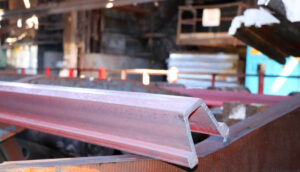
State-owned Oschadbank (Kyiv) earned UAH 6 billion in net profit in 2023, which is UAH 1.25 billion more than the previously announced preliminary data and 9.4 times higher than the financial result of 2022 (UAH 0.638 billion), the financial institution said on Friday.
“Based on the results of annual adjustments, the bank’s financial result reached almost UAH 6 billion, a record level for the entire period of its operation. (…) Thanks to this, Oschadbank has risen to the second place in the rating of profitability of Ukrainian banking institutions (according to the NBU),” the press release said.
Thus, Oschad beat Raiffeisen Bank, Sens Bank, and state-owned Ukreximbank, which, according to preliminary data, ended last year with a net profit of UAH 5.22 billion.
It is noted that the Management Board and Supervisory Board of Oschad approved the final results of the year 2023 based on the audit reports and unqualified opinion.
“The past year of 2023 was the eighth consecutive year during which the bank demonstrated profitable operations,” the press service of the financial institution emphasized.
It is also noted that in the first quarter of this year, Oschad earned UAH 4.9 billion in net profit, which is more than twice the result for the first quarter of last year.
“This is largely due to an increase in operating income, which increased by UAH 0.9 billion, or 14%, as well as a positive result of the revaluation of government bonds with an indexed value of UAH 1.2 billion,” the state bank explained.
Oschad added that an additional factor in this result is a balanced approach to optimizing operating costs, an effective risk management policy and the formation of the active part of the balance sheet “taking into account the realities and needs of the wartime economy.”
According to the National Bank of Ukraine (NBU), as of February 1 this year, Oschadbank ranked second in terms of total assets (UAH 369.56 billion) among 63 banks operating in the country.

Metinvest Group’s KAMETSTAL plant, which was set up at the facilities of Dnipro Metallurgical Plant (DMK, Kamenskoye, Dnipro Oblast), continues to master the casting of continuous billets of improved quality using continuous casting machine (CCM) No. 1.
According to the press release, the new stop-casting technology is characterized by the fact that the steel jet between the ladle and the crystallizer is protected by a dipping glass. This protects the hot metal from secondary oxidation, which adversely affects its macrostructure, and gives the billet the improved quality required by customers for some special orders.
The new technology also makes it possible to partially replace the product mix of CCM No. 2 and thus reduce the cost of additional rolls at the pipe billeting mill.
Last year, at the first stage, KAMETSTAL successfully mastered the production of continuously cast billets with a cross-section of 160×160 mm with increased requirements for chemical composition and macrostructure from St3ps/sp, C72D2, C80D2, 70, Sh2, and S355 steels. These steel grades were chosen as pilot grades in the project due to their special demand from the company’s key customers and the program for the development of new products.
“Currently, the most experienced steelmakers, repairmen, and technical management specialists involved in this large-scale project have focused on mastering the production of 200×200 mm longitudinal bar sections made of C72D2, C80D2, C50, S60, S60, S30 steel grades,” the company says.
The top priorities include improving the skills gained, selecting the best materials and refractories, and increasing production. First of all, practical tests are used to select the best granulated slag mixtures that ensure lubrication of the walls of the crystallizers and avoid secondary metal oxidation. Work is also underway to improve the durability of the submersible glasses.
Successful development of the continuous casting locking technology provides additional prospects for expanding the steel product mix. Last year, the steelmakers produced and shipped 2,218 tons of HLD-160 and 3,042 tons of HLD-200 of improved quality to Ukrainian and foreign customers.
“In 2024, we already have a program to fulfill such orders, which will increase the production of billets using the new technology and at the same time expand its product mix. These are high-margin products, which makes it possible to increase the efficiency of the shop and the enterprise as a whole,” the press release says.
“Kametstal was established on the basis of Dnipro Coke Plant (DKKhZ) and Centralized Steel Mill of Dnipro Metallurgical Plant (DMK).
According to the 2020 report of Metinvest Group’s parent company, Metinvest B.V. (Netherlands) owned 100% of the shares in DCCP.

In 2023, Astarta Agricultural Holding produced 39 thousand tons of sugar beet, up 20% year-on-year, thanks to a record yield of 58 tons/ha compared to 56 tons/ha in 2022, the company said in its annual report on Wednesday evening.
According to the agricultural holding, the record high sugar beet harvest extended the processing period until the end of January 2024. In total, the sugar production campaign in 2023 lasted 130 days, compared to 111 days a year earlier.
“In the 2023-2024 marketing year, Astarta increased sugar production by 34% year-on-year to 377 thousand tons. At the same time, the volume of sugar beet processing in 2023 increased by 37% compared to the same period last year and reached 2.7 million tons. The market share remained unchanged at 21% in 2023, the document says.
The agroholding has engaged more than 100 independent sugar beet producers in eight regions of Ukraine to supply its sugar factories with raw materials. In 2023, they increased the supply of raw materials to 26% of the total volume of this crop processed by the company (18% a year earlier) – up to 707 thousand tons of the crop.
Astarta’s share in Ukraine’s total sugar exports amounted to 12%, or about 50 thousand tons in 2023. Italy and Romania became the key export destinations for the agricultural holding, accounting for 29% and 25% of the company’s exports, respectively. Hungary, Spain and Bulgaria were also among the top five buyers of Astarta’s sugar.
99% of Astarta’s sugar was exported by land, mainly by road (67%) and rail.
Half of the sugar produced was supplied to processing companies, primarily in the food industry, including confectionery, bakery and beverage production.
Astarta also produces by-products such as pressed pulp, dry granulated pulp and molasses from its sugar beet processing and sells them domestically as ingredients for animal feed production for use in its own livestock farming or for biogas production.
The volumes of by-products produced depend on the amount of sugar beet processed, so in 2023 their production volumes increased significantly, the agricultural holding explained. The production of molasses increased by 1.5 times to 98 thousand tons, and pressed pulp – to 1.7 million tons against 1.5 million tons in 2022. Production of granulated beet pulp amounted to 28 thousand tons.
In 2023, Astarta’s bioenergy complex used 145 thousand tons, or 9% of the produced pressed pulp, to produce biogas for its facilities. In addition, 223 tons (approximately 1%) of the produced granulated sugar beet pulp was used as alternative energy at one of the agricultural holding’s sugar plants.
Sugar sales volumes increased by 26% year-on-year to 284 thousand tons in 2023, while the average selling price increased by 3% to EUR 665/ton. Realized prices increased by 18% year-on-year to 26 thousand UAH/ton (excluding VAT).

The Swiss government will allocate 5 billion francs as part of its long-term support for Ukraine. The program will last for 12 years, until 2036, the government’s press service reports.
“As a first step, about 1.5 billion Swiss francs are to be allocated from the international cooperation budget by 2028. This amount clearly demonstrates Switzerland’s solidarity with the people affected by the war in Ukraine and will increase stability on the European continent,” the statement said.
It is noted that in the period 2029-2036, the Federal Council also intends to explore other sources (in addition to international cooperation) from which the remaining 3.5 billion Swiss francs can be obtained.
The Federal Council has also commissioned the development of a joint country program for Ukraine, including appropriate oversight mechanisms. This program should ensure targeted and effective support and be based on the seven Lugano principles: partnership, reform focus, transparency, accountability and rule of law, democratic participation, multi-stakeholder engagement, gender equality and inclusiveness, and sustainability.
The Federal Council also instructed to determine how the country program for Ukraine will be implemented in the strategic plan. In particular, a proposal to establish an interagency coordination group headed by a delegate from Ukraine should be prepared and submitted to the Federation Council for approval.
Impact of electricity deficit on real GDP vs no deficit, % (forecast up to 2024)

Source: Open4Business.com.ua and experts.news
Energy imports, forecast, bln dollars

Source: Open4Business.com.ua and experts.news